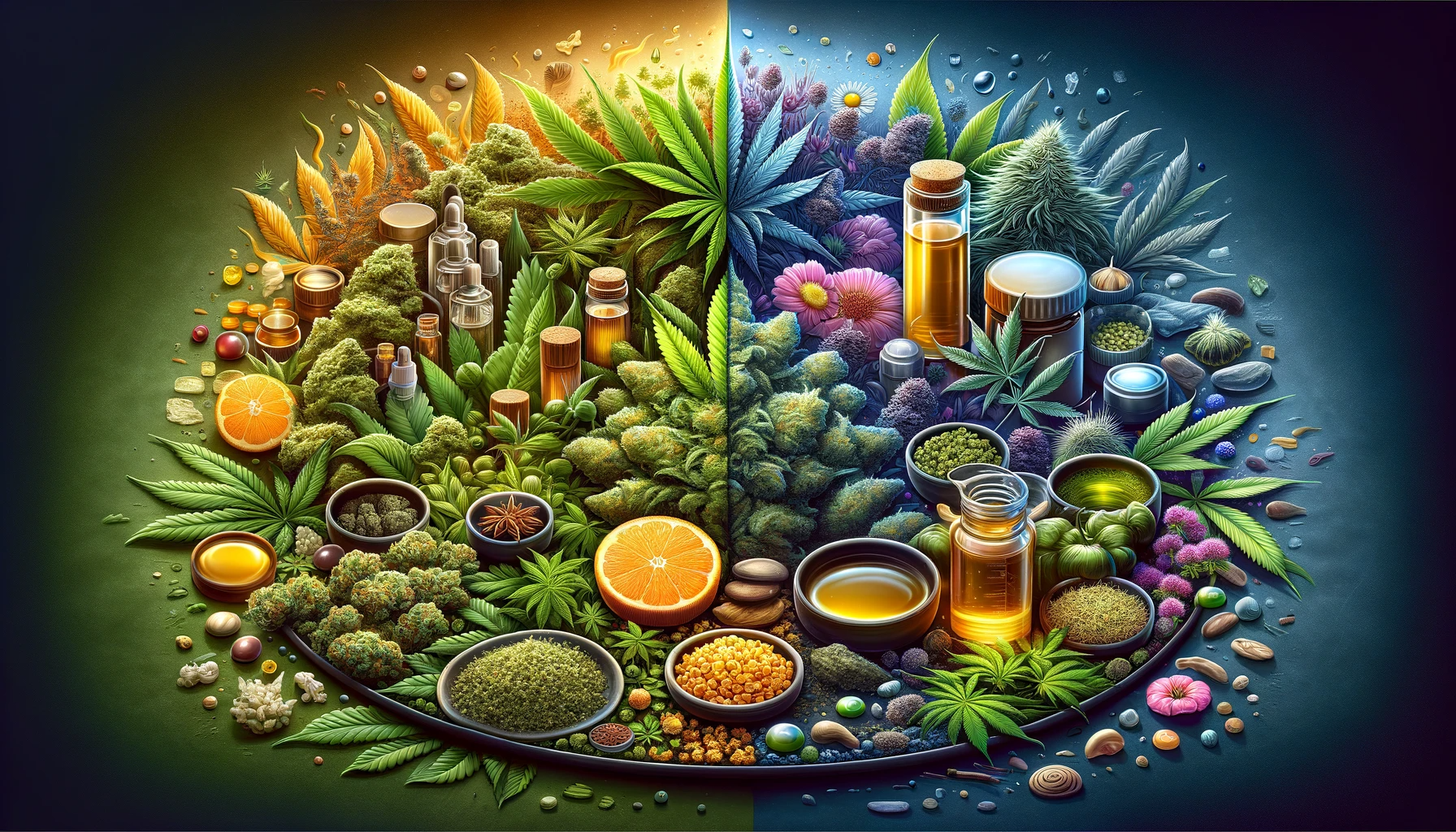CBD and THC are two of the most talked-about topics in marijuana, but how do they differ? Both of these compounds are cannabinoids present in the cannabis plant, yet there are key differences between the two. Whether inhaled or ingested, for medical or recreational use—each substance has a distinctly different effect on the brain. In this post, we’ll explain exactly what sets CBD and THC apart from one another, examining their chemical structures, legality, health benefits, and side effects. We’ll also discuss how they can be used for treating pain and symptoms of various conditions. Keep reading to learn more about the differences and similarities between these compounds!
Understanding CBD and THC
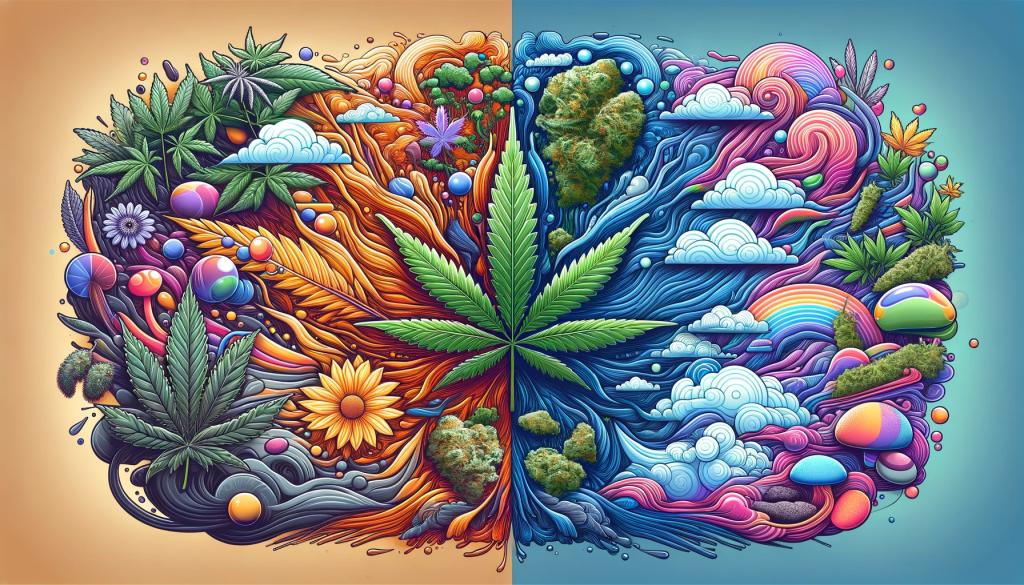
Cannabidiol (CBD) and tetrahydrocannabinol (THC) are the two main compounds found in cannabis plants. Let’s take a look at how they differ in regard to chemical structure and psychoactive impact.
Chemical Structure
Both cannabinoids have the same molecular structure, which consists of 21 carbon atoms, 30 hydrogen atoms, and 2 oxygen atoms. However, they differ significantly in their chemical structure, as their atoms are arranged differently. Where CBD contains a hydroxyl group, THC has a cyclic ring instead. In other words, THC has one more ring than CBD does, which is responsible for the large difference in their pharmacological effects.
Cornbread Hemp
<p>Full Spectrum Hemp Gummies with up to 50mg per serving. No high-fructose corn syrup, gelatin, or artificial colors, just the highest quality vegan hemp gummies.</p>
Learn More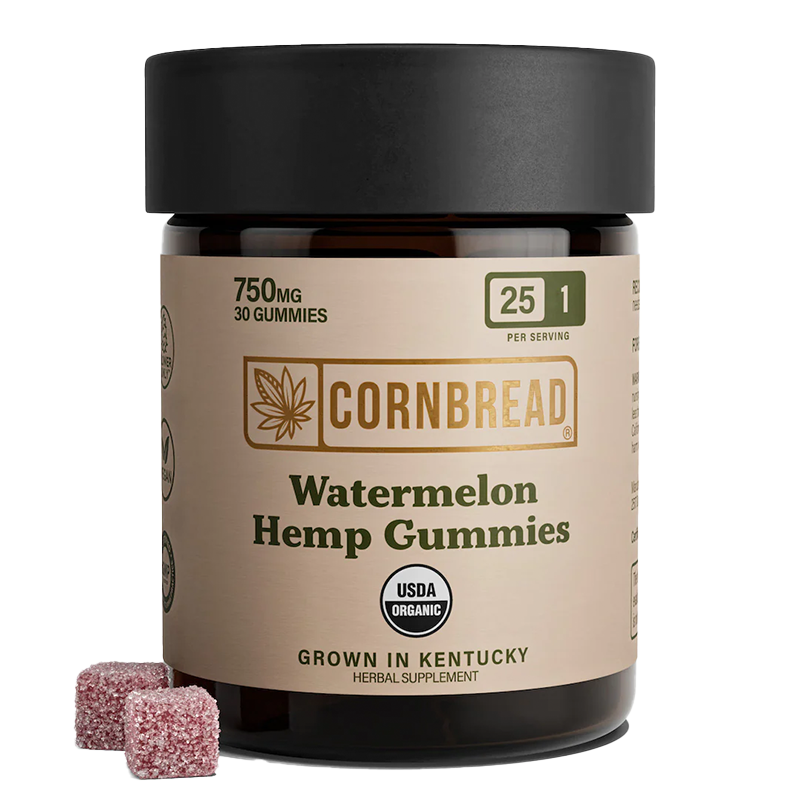
Psychoactive Effects
THC is the primary compound typically associated with marijuana and cannabis products. As a psychoactive substance, it can disrupt mental functions, resulting in altered perception, euphoria, physical impairment, and other effects such as dizziness or disorientation. THC is what’s responsible for the “high” feeling that usually comes with marijuana use.
CBD, on the other hand, doesn’t produce any mind-altering effects. Unlike THC—which has extreme psychotropic potency when consumed orally or smoked through vaporization processes—CBD has very limited binding affinity for receptors that control cognitive and memory function. As a result, it generally doesn’t induce changes in mental functions.
Overview of Differences Between CBD and THC

CBD and THC are both cannabinoids found in cannabis plants. These compounds are both present in the cannabis sativa plant, whereas THC is also found in the cannabis indica plant. Among the many differences between the two are their legality, potential benefits, and possible side effects.
Legal Status
CBD and THC have vastly different legal statuses due to the variance in their chemical composition. CBD is generally considered a non-psychoactive compound, meaning it doesn’t produce mind-altering effects, while THC is a psychoactive compound.
CBD products can typically be sold legally as long as they’re derived from hemp, contain less than 0.3% of THC, and comply with state laws regarding production and distribution processes. On the other hand, since THC does possess psychotropic properties, it’s subject to stricter regulations. Only licensed cannabis retailers are permitted to sell these products in accordance with state regulations.
Federal and state laws regarding these two substances found in the cannabis plant are constantly changing and sometimes conflict. On a federal level, THC is illegal and CBD is only legal if it’s hemp-derived. In some states, these compounds can be legally used for medicinal and/or recreational purposes, and in other states, they can’t be legally used at all. For this reason, it’s essential to check your local and state policies on cannabinoid use.
Potential Benefits
Both of these cannabis-derived compounds have medicinal properties that can assist with managing symptoms of various physical and mental health conditions. Some of their possible benefits include: pain relief, inflammation reduction, and alleviating symptoms of epilepsy and anxiety. In addition, CBD is being researched to determine its potential for treating cancer, Alzheimer’s disease, and multiple sclerosis.
CBD lacks the mind-altering effects associated with THC, which makes it a viable option for medical use. It may help decrease anxiety, and it has the potential to alleviate symptoms of post-traumatic stress disorder (PTSD). It’s usually sold as an oil, making it easily accessible for medicinal use. Medical CBD is often derived from hemp instead of marijuana to ensure lower amounts of THC.
Possible Side Effects
THC and CBD both come with the risk of possible side effects. Generally, CBD has fewer negative side effects than THC. The following are some of the effects that may occur with THC use:
- Fatigue
- Dry mouth
- Short-term memory impairment
- Anxiety
- Impaired motor function
- Delayed reaction times
- Delusions (with high doses)
- Hallucinations (with high doses)
- Paranoia
The possible side effects of CBD tend to be milder and include the following:
- Dry mouth
- Low blood pressure
- Drowsiness
- Fatigue
- Lightheadedness
- Reduced appetite
- Diarrhea
How CBD and THC Affect the Central Nervous System
The chemical structures of these two chemical compounds enable them to interact with the body’s endocannabinoid system, which includes cannabinoid receptors in the central nervous system. The two primary types of receptors they bind with are CB1 and CB2.
Both of these cannabinoids can bind to both CB1 and CB2 receptors, however, they usually have different effects on each receptor. For example, THC has a higher binding affinity for the CB1 receptor than CBD does, causing it to produce psychoactive effects that influence perception, cognition, emotions, motor function, and coordination.
On the other hand, while CBD binds weakly to the CB1 receptor at lower doses, this binding is disrupted when combined with high concentrations of THC, resulting in reduced psychoactivity.
The interactions between these two cannabinoids and the endocannabinoid system can produce an array of effects ranging from a sense of calmness to intense feelings of anxiety.
CBD vs. THC for Pain and Symptom Management
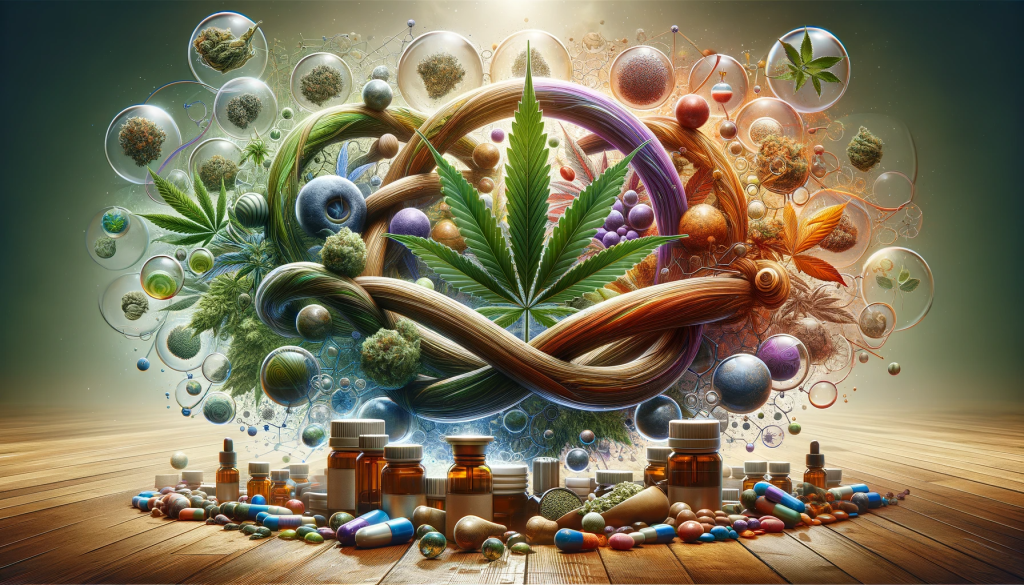
Both CBD and THC have shown promising potential for alleviating acute and chronic pain, as well as various symptoms of other physical and mental conditions.
Both of these cannabinoids can be effective tools in managing pain, although their efficacy and potential side effects vary. When used alone or in combination with one another, both cannabinoids may provide relief from various forms of chronic musculoskeletal pain such as headaches, inflammation, neuropathy, and muscle aches.
CBD can potentially reduce inflammation within the body while also providing anti-anxiety benefits that can help to alleviate overall muscle tension. THC also has anti-inflammatory properties, and its euphoric effects at low doses may provide further relief by treating secondary psychological symptoms that often accompany chronic illness such as depression and anxiety..
Please note that while these cannabinoids can have potential therapeutic benefits, it’s always important to consult with a healthcare provider before starting any new treatment regimen, especially when it comes to using cannabis products.
Choosing the Right Cannabis Product
When it comes to selecting a cannabis product, there are several factors to consider to ensure you make the best possible choice for your specific needs. Before you smoke marijuana or use hemp products, think about the following:
Legality: Depending on where you’re located, the legality of THC and CBD products can vary. If medical or recreational marijuana is legal in your region, then it’s important to check if specific cannabis products are legally available in your state or area.
Medical Benefits: Both CBD and THC in medical marijuana have the potential to provide relief from a variety of symptoms including chronic pain, inflammation, anxiety, and depression. It’s important to consider which cannabinoids will best meet your needs based on information about the particular therapeutic effects associated with each compound.
Side Effects: While both THC and CBD have therapeutic properties, they do come with potential side-effects such as feelings of paranoia or nausea, respectively. Additionally, these compounds may have adverse interactions with certain medications, so be sure to consult your doctor before use.
Variability in THC and CBD Levels: Cannabis extracts can vary significantly in their concentrations of THC and CBD, so it’s important to read lab tests indicating the potency percentage level for each compound before making a purchase.
Accurate Labeling: Unfortunately, not all labeling is accurate when it comes to hemp-derived products. Many products contain either different cannabinoid levels than indicated on the label or no amounts at all. To ensure you’re getting a high-quality product that’s as-advertised, we recommend sticking to retailers that allow easy access to third-party lab reports so you can verify the potency and safety of the products.
Potential Synergistic Effects of THC and CBD
The potential synergistic effects of combining THC and CBD are useful for enhancing the therapeutic benefits of cannabis. They can work together to produce what’s known as “the entourage effect,” which occurs when multiple compounds interact with each other to produce enhanced results.
These compounds include different cannabinoids, terpenes, flavonoids, and other substances that are naturally present within the plant. By combining the natural properties of multiple cannabis compounds, patients may experience more balanced effects than from any individual cannabinoid. Variations in ratios between CBD and THC lead to differing degrees of synergy. Combining these two powerful compounds can result in greater efficacy than either one alone.
CBD vs. THC: Potential Risks and Side Effects
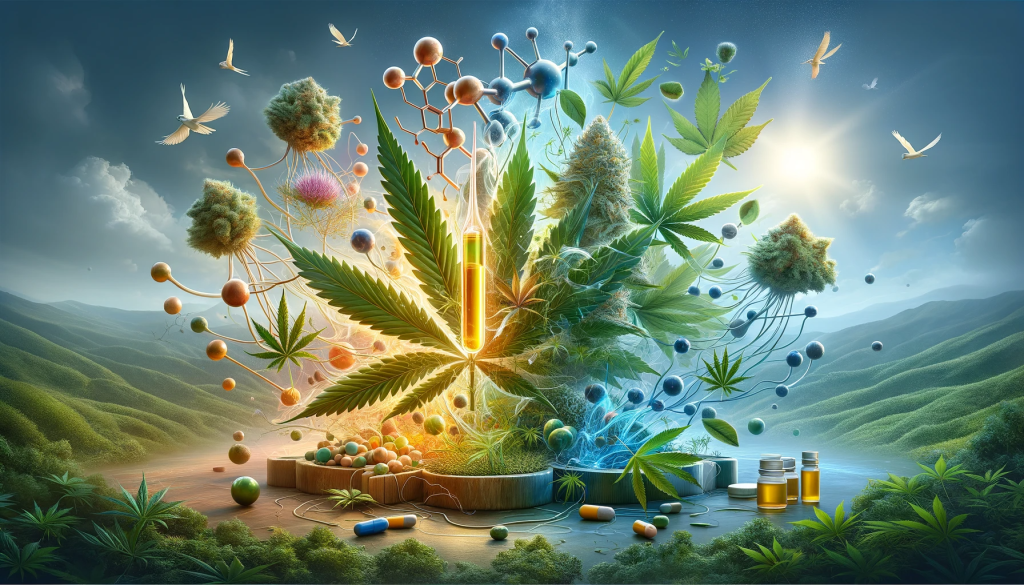
The use of THC can produce psychotropic effects, which can lead to addiction and must be considered before using cannabis products.
Psychotropic Effects of THC
THC is the main psychoactive compound found in marijuana. It can produce feelings of euphoria, relaxation, and altered perception that many people find pleasurable. Inappropriate or recreational use may cause short-term paranoia, anxiety, or distorted sensory perceptions. According to the National Institute on Drug Abuse, large doses of THC or use of highly potent products can result in unpleasant effects such as delusions, panic, distrust, anxiety, and fear.
Over time, continued use can cause long-term symptoms such as impaired cognitive function and an increased risk for mental health issues like cannabis-induced psychosis, which presents similar symptoms to schizophrenia.
While some people find these effects desirable—namely those who use cannabis therapeutically—it’s important to be aware of the potential risks associated with THC so you can make informed decisions about your use or treatment plan.
Potential for Addiction
One of the primary concerns associated with THC is its potential for addiction. Substance abuse or Substance Use Disorder (SUD) is a condition defined by an impaired ability to control and moderate substance use, despite the negative consequences associated with it.
Consuming high levels of THC frequently over an extended period may result in a heightened risk of drug abuse. Using products with higher THC levels—such as those often found in edibles—can present a significantly higher risk for addiction than other forms of marijuana consumption because the effects can take a while to kick in and last longer than with smoking, vaping, or tincture use. This could lead to people taking more after initially feeling no effect from low doses, resulting in a heightened onset of intoxication due to increased potency levels. According to the Centers for Disease Control and Prevention, about 30% of marijuana users have marijuana use disorder.
Those who suffer from marijuana use disorder may experience a range of cognitive impairments including deficits in attention, memory, learning, and decision-making, leading to long-term, detrimental impacts on academic performance, professional performance, and quality of life.
CBD vs. THC: Drug Testing and Legality
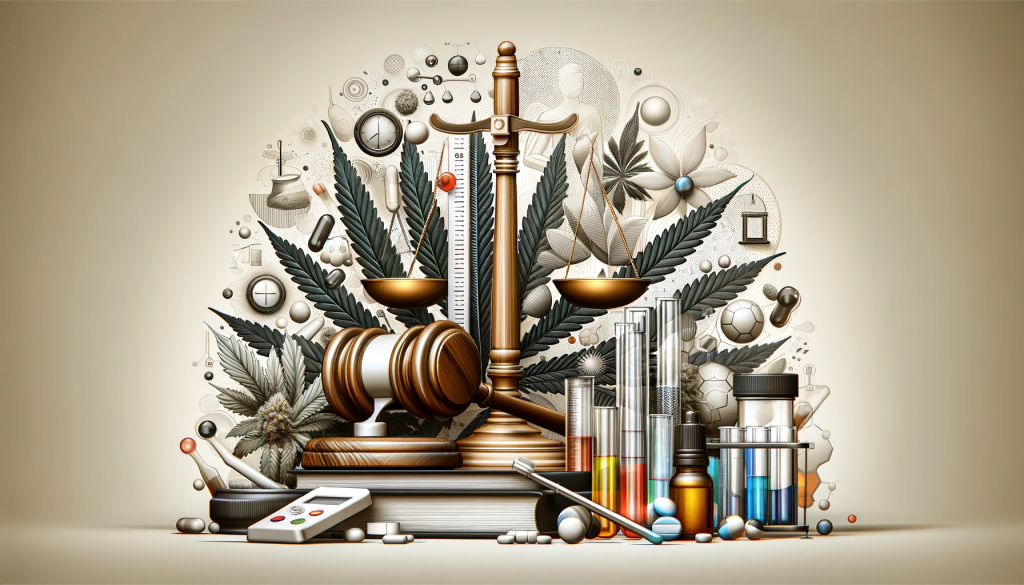
CDB and THC also differ in their drug screen detectability and legality on federal and state levels.
Drug Test Detectability
Drug testing is commonplace across many industries to ensure workers’ safety, or in some places, simply as a condition of employment. With the rise in use and popularity of cannabis-derived products like CBD oil, it’s important to be aware of how these compounds are detected by drug screens.
It’s important to consider that some hemp/CBD products may cause positive drug test results for cannabis, while others remain safe from detection. The use of certain CBD supplements can still result in positive drug tests due to the presence of trace amounts of THC (up to 0.3%), which remains detectable in the body after consumption.
To reduce this risk, consumers must research products thoroughly before purchase. Isolates with all THC removed from the extract greatly reduce detectability. A product that contains only CBD and no THC is incredibly unlikely to show up on a drug test as long it doesn’t contain any traces of other compounds derived from marijuana plants or industrial hemp such as terpenes and flavonoids. Even low concentrations can potentially show up on a urine analysis test.
In summary, THC is highly detectable; even trace amounts are likely to show up on drug screens. CBD alone won’t cause positive test results, but it’s important to make sure the CBD product you choose doesn’t contain any traces of THC to avoid an increased risk of a drug test possibly detecting cannabis; this applies to both prescription and nonprescription CBD products.
Legality of CBD and THC
You’re probably wondering—are THC and CBD legal? Under federal law, both CBD and THC are prohibited in the United States. Because of it’s mind-altering properties, THC is subject to stricter policies than CBD. Under the Controlled Substances Act, THC is considered a Schedule 1 drug—meaning it has a high risk for being abused and isn’t recognized as being medically beneficial. Possession, sale, or use of THC are punishable by the Drug Enforcement Administration. However, federal law enforcement is lax—especially in states where THC is legal. State laws regarding these cannabinoids often conflict with federal laws, so it’s important to be aware of local regulations in your area.
FAQ
What are CBD and THC?
CBD and THC are active compounds found in the cannabis plant. CBD is a non-psychoactive compound, while THC has psychoactive properties that produce a “high” feeling when consumed.
Are there any potential health benefits of using CBD or THC?
CBD/THC products have potential therapeutic properties and can be used to help manage pain, inflammation, anxiety, depression, seizures, arthritis symptoms, etc. Medical marijuana can also help those who suffer from poor appetite due to cancer treatment or AIDS put on weight by stimulating the appetite and reducing nausea and vomiting. According to some studies, CBD possibly decreases seizures in epilepsy patients.
What’s the difference between CBD oil and hemp seed oil?
The most common types of hemp-derived CBD products are CBD oils, which are made from the leaves, flowers, and stems of the cannabis plant. In contrast, hemp seed oil is extracted from the seeds of the cannabis plant, specifically the cannabis sativa plant.
How does medical cannabis differ from regular cannabis?
Medical cannabis is a drug comprised mostly of CBD with minimal amounts of THC, whereas recreational cannabis typically contains more THC. As a result, medical cannabis is less likely to produce mind-altering effects. When used in place of or in combination with other medications, it has the potential to alleviate a wide range of physical and psychological symptoms.
Is CBD safe for children?
Many studies have yielded promising results suggesting that CBD can be useful for managing a variety of symptoms and conditions. However, not much is known about its effects on children. According to Harvard Health Publishing, it’s unclear whether CBD use, in any amount, is safe for those under 21 years old. As a result, we recommend keeping both marijuana and CBD products away from children.
Are cannabinoids FDA-approved for medical use?
No. According to the National Center for Complementary and Integrative Health, cannabis and cannabinoids haven’t been approved by the U.S. Food and Drug Administration for medical use at this time.
Conclusion
The distinction between CBD and THC is important for those considering the use of marijuana products, whether for medical or recreational purposes. Each of these substances is an active ingredient derived from cannabis plants with its own distinctive properties. While both may have medicinal benefits and can be used for pain relief, their effects on the body vary due to a difference in chemical structure. CBD doesn’t produce psychoactive effects like THC, which is a popular choice among recreational users. Both compounds are illegal on a federal level, however, the legality of THC and hemp-derived CBD products on a state level vary by jurisdiction. To ensure safe use, it’s essential to understand these differences so you can make the best decision for your needs and act within legal limits.
